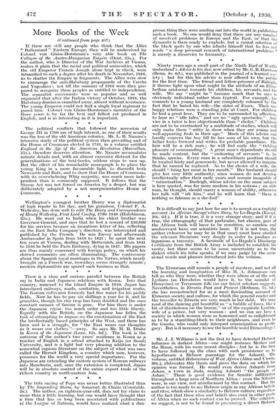There is a close and curious parallel between the British
raj in India and Japanese relations with Korea. Into that country, annexed to the island Empire in 1910, Japan has introduced railways, roads, sanitation, and irrigation works. The Korean cultivator formerly had free water for his paddy fields. Now he has to pay six shillings a year for it, and he grumbles, though his rice crop has been doubled and the once constant menace of famine is gone. For him there is under the Japanese regim, too much order and too little liberty. Equally with the British, on the Japanese has fallen the task of attempting to impose on the emotionalism of the East the intellectually based principles of the West, and there has been and is a struggle, for "the East wears our thoughts as it wears our clothes "—awry. So says Mr. H. B. Drake in Korea of the Japanese (Lane, 12s. 6d.). The book is the outcome of the author's two years' residence in Korea as a teacher of English in a school attached to Keijo (or Seoul) University, and is a light but very pleasing addition to the somewhat copious literature on the subject of what was once called the Hermit Kingdom, a country which now, however, possesses for the world a very special importance. For the Japanese are extending the eastern system of Korean railways into Manchuria, and, once the extension is completed, Japan will be in absolute control of the entire export trade of the richest country in north-eastern Asia.
* • a *




















































 Previous page
Previous page